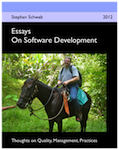Old Chinese motivational method
My current client has offices in the old Chinese capital city of Xi’an in central China, which has over 3,100 years of history. Over the last two weeks I had an opportunity to visit, see the city, the terracotta army and also work with two groups on the concepts behind Acceptance Test Driven Development (ATDD).
During conversations in the workshops one tester told an interesting story about “testing” in the very distant past. It was about a walled city that had walls of such good quality that it was very difficult to conquer. I searched for more information about the city of Tungwan and came across a Danish website with more details about the history of that city and its people.
I’m quoting from the Danish website to tell the story:
In 407 AC, a Tiefu Xiongnu named Liu Bobo founded the kingdom “Xia” in the modern Ning Xia area. He called it “Xia” because of the history that the Xiongnu descended from the ancient Xia Dynasty. In 413 AC he decided to build a capital, which should be absolutely impossible for the enemy to capture. He gave the responsiblity for managing the construction to his evil general, Chigan Ali. The city was named “Tungwan”, which means the United ten thousand, as it was Bobo’s goal to rule all China’s ten thousand states.
The story then describes testing of the wall:
Chigan ordered that all soil that would be used for city walls, should be boiled (with rice) to make it hard and difficult to destroy. He often tested the quality of the wall, if an iron wedge were able to penetrate more than an inch into the wall, the foreman, who was responsible for this section of the wall, would be executed, and the corpse would be used as filling in the internal wall.
But that was not all. They applied a similar motivational technique to the manufactoring of weapons and armor:
Liu Bobo supervised himself the manufacture of weapons and armor. He gave the order that they should be tested in such way that the arrows were shot against the armor; if the arrows could penetrate the armor, then the black smiths, who had produced the armor, should be beheaded; if the arrows could not penetrate the armor, then the smiths, who had produced the arrowheads should be executed. In this way, both fortifications, weapons and armor became of very high quality.
Liu Bobo later changed his name to Helian Bobo. Apparently he was quite a violent person:
A Chinese historian described Helian Bobo like this: “He was arrogant and cruel, and he treated people like weeds. Often he entered a tower with bow and arrow, and whenever he got an impulsive suspicion, resentment or anger against someone, he would personally kill him. If someone stared at him, would he cut his eyes out. Anyone, who laughed too heartily, would have their lips cut open with a knife. Anyone, who dared to have a different opinion than he, would first get their tongue cut out, and then their head would be severed.
And as the father so were the sons:
Helian Bobo decided in 424 AC, for reasons which have not made their way to written history, to push his eldest son, Helian Gui, aside as a crown prince and instead appoint a second son, Helian Lun, to succeed him. Helian Gui was a very skilled general, immediately he led his soldiers against Helian Lun, defeated him and killed him. When a third son Helian Chang heard this, he conducted a surprise attack, killed Helian Gui, took command of his troops and led them back to the capital, Tongwan. It impressed his father so much that he appointed Helian Chang to be his crown prince. On the other hand the old man had little left for a fourth son, Helian Ding. It is said that Ding had too easy to laughter after Bobo’s taste. Helian Bobo died in the summer of 425 AC, and his son, Helian Chang, succeeded him.
| Previous | 11 Aug 2014 | Next |
This article has been posted to social media sites. There might be comments. Just follow the links:








